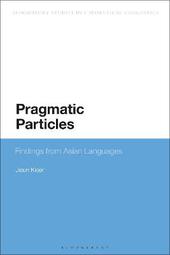
|
Pragmatic Particles: Findings from Asian Languages
Hardback
Main Details
| Title |
Pragmatic Particles: Findings from Asian Languages
|
| Authors and Contributors |
By (author) Jieun Kiaer
|
| Series | Bloomsbury Studies in Theoretical Linguistics |
|---|
| Physical Properties |
| Format:Hardback | | Pages:256 | | Dimensions(mm): Height 234,Width 156 |
|
| Category/Genre | Grammar and syntax |
|---|
| ISBN/Barcode |
9781350118461
|
| Classifications | Dewey:415/.5 |
|---|
| Audience | | Tertiary Education (US: College) | |
|---|
|
Publishing Details |
| Publisher |
Bloomsbury Publishing PLC
|
| Imprint |
Bloomsbury Academic
|
| Publication Date |
26 November 2020 |
| Publication Country |
United Kingdom
|
Description
Pragmatic Particles sheds new light on the linguistic theory and application of Asian languages with a particular focus on the role of particles and their socio-pragmatic nature. Drawing on a range of data that spans Hindi, Japanese, Korean, Mongolian, Turkish and beyond, the multidimensionality of Asian languages is brought to attention. Particles are central in this discourse and their constructive, expressive and attitudinal behaviours are revealed to be neither arbitrary nor peripheral. By branching away from a predominantly Euro-centric discussion and covering the relevant formal and functional foundations of syntax and semantics, this book offers an alternative lens to the appropriate treatment of Asian languages in contemporary linguistics.
Author Biography
Jieun Kiaer is Professor in Korean Language and Linguistics at the University of Oxford, UK.
ReviewsAn inspirational book which is informative and practical. Through an easily accessible approach to the subject, this book gives new insights to readers who have a keen interest in the socio-pragmatic elements of language and linguistic theories beyond the Anglo-centric discussion. * Frontiers in Psychology * [T]his book makes a significant contribution to the study of particles in Asian languages and further to theoretical linguistics in general. It adopts a comprehensive approach encompassing formal and functional theories of grammar, and effectively deals with the multidimensionality of meaning that cannot be addressed in a streamlined way otherwise. Researchers at various levels and persuasions will benefit from reading it. * Journal of Pragmatics: An Interdisciplinary Journal of Language Studies * This book offers invaluable insights into the development of a formal framework for investigating pragmatic particles, by using examples from a number of Asian languages. The words in the book title ring true as data from various Asian language families are presented. * Journal of Contrastive Pragmatics * This book enables learners, researchers and teachers of languages to understand the formal and functional foundations of Asian languages - in a sensible and holistic way. It bridges the gap between formal and functional, theoretical and empirical approaches to language. I highly recommend this book to those who are interested in linguistic theory beyond the Anglo-centric discussion. * Seungho Nam, Professor of Linguistics, Seoul National University, South Korea * This book makes a significant and important contribution both to theoretical linguistics and the study of particles in Asian languages. Using data from across languages of Asia from the Middle to the Far East, Kiaer puts forward cogent and compelling arguments that such languages should have a greater influence on the developments of theories of language and not be analysed in terms of euro-centric views of grammar. She further argues that socio-pragmatic properties of these particles are central to explaining their syntactic and other grammatical behaviour. * Ronnie Cann, Profesor Emeritus of Linguistic Smantics, University of Edinburgh, UK * Pragmatic Particles timely brings to the forefront of discussion the multidimensionality of Asian languages within the realm of contemporary linguistics. By challenging verb-centric, sentence-bound analyses which permeate the prevailing Euro-centric views on linguistic theory and application, this book offers both theoretical and empirical insight into researching Asian languages. It takes an accessible approach to the subject and encourages readers to re-evaluate the treatment of linguistic data, while critically guiding them through this process. Whether you have a budding curiosity for linguistic theory or a deep interest in the socio-pragmatic elements of language, I highly recommend you to read this book. * Ahn Hyejeong, Lecturer in Language and Communication, Nanyang Technological University, Singapore *
|